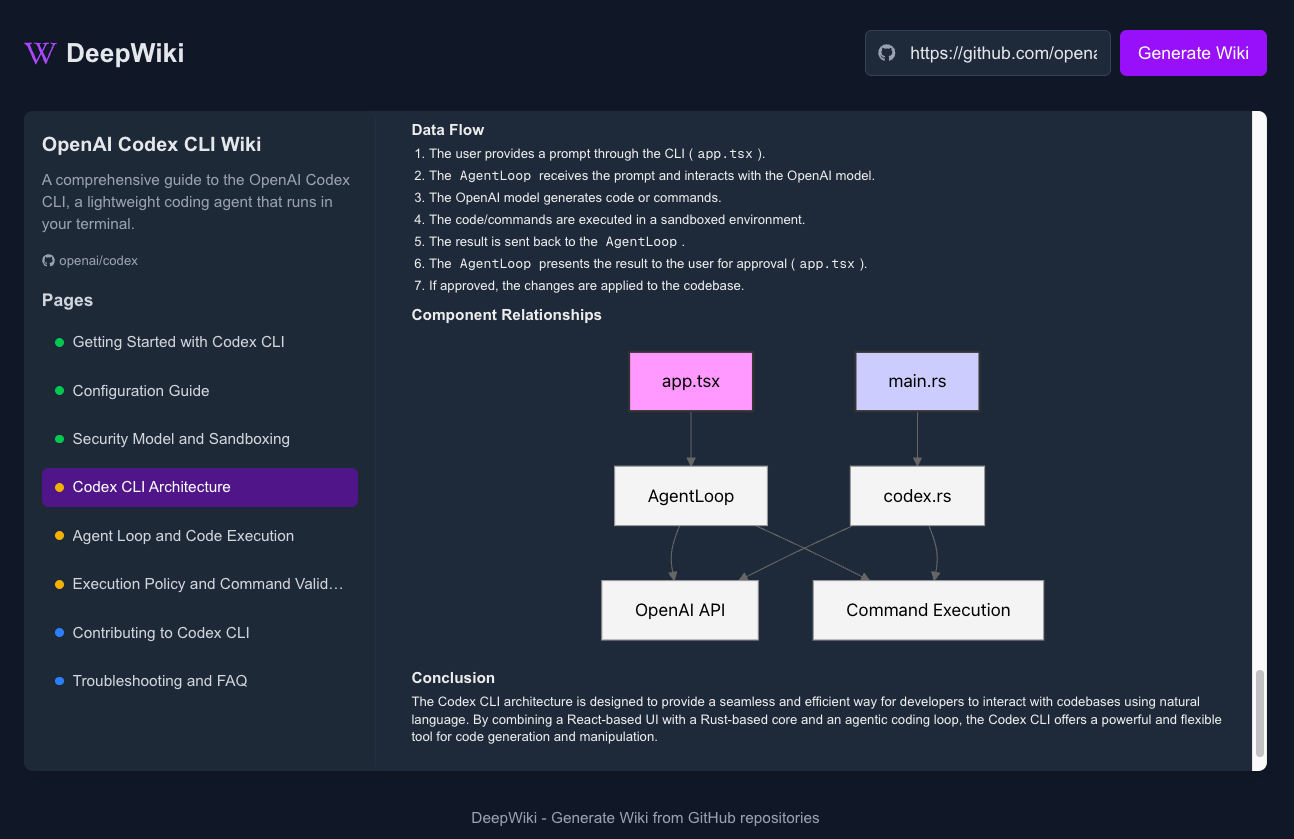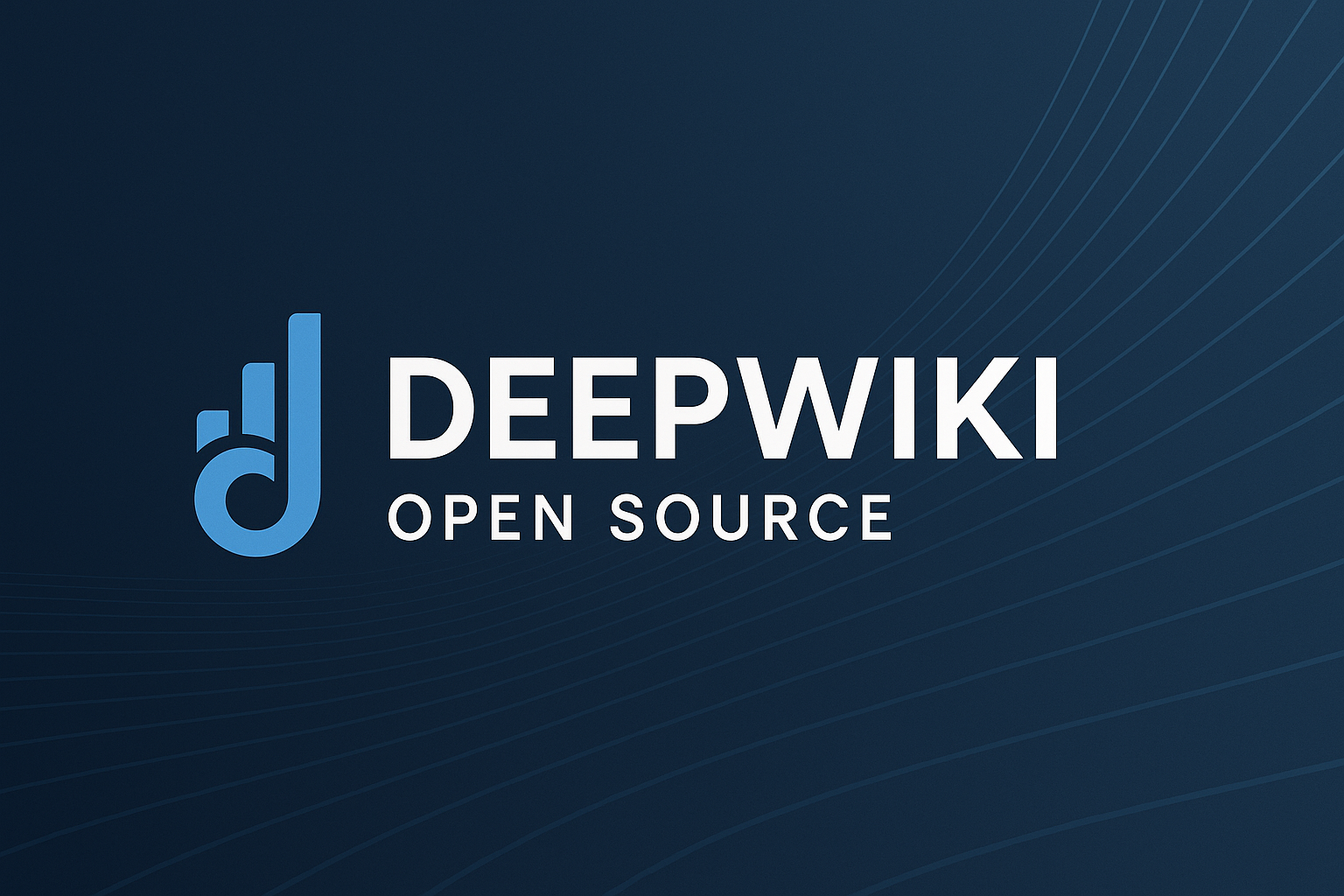DeepWiki is my own implementation attempt of DeepWiki, automatically creates beautiful, interactive wikis for any GitHub repository! Just enter a repo name, and DeepWiki will:
- Analyze the code structure
- Generate comprehensive documentation
- Create visual diagrams to explain how everything works
- Organize it all into an easy-to-navigate wiki
- Instant Documentation: Turn any GitHub repo into a wiki in seconds
- Smart Analysis: AI-powered understanding of code structure and relationships
- Beautiful Diagrams: Automatic Mermaid diagrams to visualize architecture and data flow
- Easy Navigation: Simple, intuitive interface to explore the wiki
Create a .env file in the project root with these keys:
GOOGLE_API_KEY=your_google_api_key
OPENAI_API_KEY=your_openai_api_key
💡 Where to get these keys:
- Get a Google API key from Google AI Studio
- Get an OpenAI API key from OpenAI Platform
# Install Python dependencies
pip install -r api/requirements.txt
# Start the API server
python -m api.main# Install JavaScript dependencies
npm install
# or
yarn install
# Start the web app
npm run dev
# or
yarn dev- Open http://localhost:3000 in your browser
- Enter a GitHub repository (like
facebook/reactorvercel/next.js) - Click "Generate Wiki" and watch the magic happen!
DeepWiki uses AI to:
- Clone and analyze the GitHub repository
- Create embeddings of the code for smart retrieval
- Generate documentation with context-aware AI
- Create visual diagrams to explain code relationships
- Organize everything into a structured wiki
graph TD
A[User inputs GitHub repo] --> B[Clone Repository]
B --> C[Analyze Code Structure]
C --> D[Create Code Embeddings]
D --> E[Generate Documentation]
D --> F[Create Visual Diagrams]
E --> G[Organize as Wiki]
F --> G
G --> H[Interactive DeepWiki]
classDef process fill:#f9f,stroke:#333,stroke-width:2px;
classDef data fill:#bbf,stroke:#333,stroke-width:2px;
classDef result fill:#bfb,stroke:#333,stroke-width:2px;
class A,D data;
class B,C,E,F,G process;
class H result;
deepwiki/
├── api/ # Backend API server
│ ├── main.py # API entry point
│ ├── api.py # FastAPI implementation
│ ├── rag.py # Retrieval Augmented Generation
│ ├── data_pipeline.py # Data processing utilities
│ └── requirements.txt # Python dependencies
│
├── src/ # Frontend Next.js app
│ ├── app/ # Next.js app directory
│ │ └── page.tsx # Main application page
│ └── components/ # React components
│ └── Mermaid.tsx # Mermaid diagram renderer
│
├── public/ # Static assets
├── package.json # JavaScript dependencies
└── .env # Environment variables (create this)
| Variable | Description | Required |
|---|---|---|
GOOGLE_API_KEY |
Google Gemini API key for AI generation | Yes |
OPENAI_API_KEY |
OpenAI API key for embeddings | Yes |
PORT |
Port for the API server (default: 8001) | No |
The API server provides:
- Repository cloning and indexing
- RAG (Retrieval Augmented Generation)
- Streaming chat completions
For more details, see the API README.
 The main interface of DeepWiki
The main interface of DeepWiki
Watch DeepWiki in action!
- "Missing environment variables": Make sure your
.envfile is in the project root and contains both API keys - "API key not valid": Check that you've copied the full key correctly with no extra spaces
- "Cannot connect to API server": Make sure the API server is running on port 8001
- "CORS error": The API is configured to allow all origins, but if you're having issues, try running both frontend and backend on the same machine
- "Error generating wiki": For very large repositories, try a smaller one first
- "Diagram rendering error": The app will automatically try to fix broken diagrams
- Restart both servers: Sometimes a simple restart fixes most issues
- Check console logs: Open browser developer tools to see any JavaScript errors
- Check API logs: Look at the terminal where the API is running for Python errors
Contributions are welcome! Feel free to:
- Open issues for bugs or feature requests
- Submit pull requests to improve the code
- Share your feedback and ideas
This project is licensed under the MIT License - see the LICENSE file for details.

